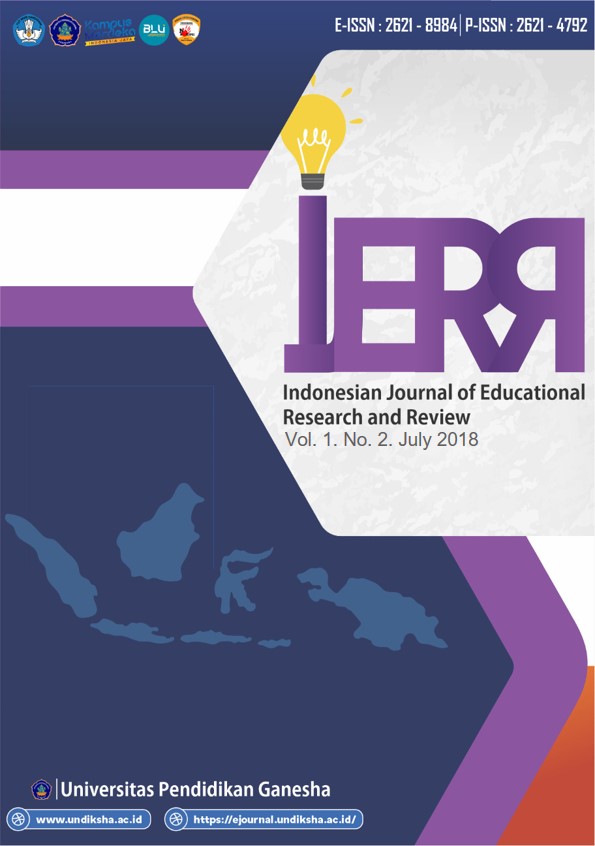PENGARUH MODEL PEMBELAJARAN COOPERATIVE SCRIPT BERBANTUAN MEDIA STRIP STORY TERHADAP KOMPETENSI PENGETAHUAN BAHASA INDONESIA
DOI:
https://doi.org/10.23887/ijerr.v1i2.14706Abstract
This study aims to determine the significant effect of the knowledge competency of Bahasa Indonesia between the group of students who were studied through cooperative script learning model with strip story media with the group of students who were not studied through cooperative script learning model with strip story media on the fourth grade of students gugus IV Kuta Selatan academic year 2017/2018. This type of study is a quasi experiment with nonquivalent control group research design. The population of study is the fourth grade of students Gugus IV Kuta Selatan academic year 2017/2018 in total 416 students. The sample is determined by random sampling technique. The sample of study is the students of class IVA SD No. 10 Jimbaran as experimental group and the students of class IVA SD No. 4 Jimbaran as control group. The mastery data of the knowledge competency of Bahasa Indonesia is collected by the instrument in form of 23 questions of multiple-choice objective test which is validated. The mastery data of the knowledge competency of Bahasa Indonesia is analyzed by t-test. The result of the analysis shows that there is a significant influence on the mastery of the knowledge competency of Bahasa Indonesia between the group of students who were studied through cooperative script learning model with strip story media with the group of students who were not studied through cooperative script learning model with strip story media on the fourth grade of students gugus IV Kuta Selatan academic year 2017/2018. It is proved by thitung = and at the significant level 5% ( =0,05) with dk = (35+30) – 2 = 63 obtained ttabel = 2,000. Based on test criteria thitung = > ttabel (α=0,05) = 2,000. As well as average score of the mastery of knowledge competency of Bahasa Indonesia of experimental students X1= 0,46 > X2= 0,20 the average score of the mastery of knowledge competency of Bahasa Indonesia of control group students. Thus it can be concluded that cooperative script learning with story strip media influence on the mastery of the knowledge competency of Bahasa Indonesia on the fourth grade of students in SD Gugus IV Kuta Selatan academic year 2017/2018.
References
Arikunto, Suharsimi. 2015. Dasar-dasar Evaluasi Pendidikan. Jakarta: Bumi Aksara.
Arsyad, Azhar. 2017. Media Pembelajaran.Jakarta: Rajawali Pers.
Asriyani, Sri. (2017). “Pengaruh Model Pembelajaran Cooperative Script Berbantuan Cerita Rakyat Terhadap Literasi Siswa Kelas III SD Gugus Kecamatan Klungkung Kabupaten Klungkung Tahun Pelajaran 2016/2017”.Pacasarjana Universitas Pendidikan Ganesha, Volume 5, Nomor 2 (diakses tanggal 9 Januari 2018).
Budiyanto, Krisno.2016. Sintaks 45 Model Pembelajaran dalam Sudent Centered Learning (SCL). Malang:Universitas Muhammadiyah.
Dantes, Nyoman. 2012. Metode Penelitian.Yogyakarta: C.V. Andi Offset.
Setyosari, Punaji. 2015. Metode PenelitianPendidikan dan Pengembangan.Jakarta: PT. Kharisma Putra Utama
Sugiyono. 2017. Metode Penelitian.Bandung: Alfabeta.
Susanto, Ahmad. 2013. Teori Belajar dan Pembelajaran di Sekolah Dasar. Jakarta: Kharisma Putra Utama.
Tarigan, Henry Guntur. 2015. Membaca Sebagai Suatu Keterampilan Berbahasa. Bandung:
Angkasa.
Taufina, 2016. Mozaik Penilaian Pembelajaran Dan Apresiasi Sastra Indonesia di Sekolah Dasar. Bandung: Angkasa
Downloads
Published
How to Cite
Issue
Section
License
Authors who publish with the Indonesian Journal of Educational Research and Review (IJERR) agree to the following terms:
- Authors retain copyright and grant the journal the right of first publication with the work simultaneously licensed under a Creative Commons Attribution-ShareAlike 4.0 International License. that allows others to share the work with an acknowledgment of the work's authorship and initial publication in this journal.
- Authors are able to enter into separate, additional contractual arrangements for the non-exclusive distribution of the journal's published version of the work (e.g., post it to an institutional repository or publish it in a book), with an acknowledgment of its initial publication in this journal.
- Authors are permitted and encouraged to post their work online (e.g., in institutional repositories or on their website) prior to and during the submission process, as it can lead to productive exchanges, as well as earlier and greater citation of published work. (See The Effect of Open Access)









